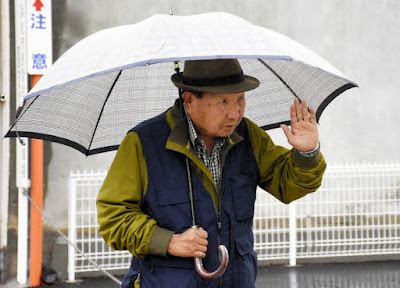Saudi Arabia on Tuesday beheaded an Indonesian domestic worker who knifed to death a Saudi woman described in press reports as her employer.
The interior ministry said Siti Zainab was executed after being convicted of stabbing and beating Saudi woman Noura al-Morobei to death.
The sentence was carried out on Tuesday in the Muslim holy city of Medina, the ministry said in a statement carried by the official Saudi Press Agency.
Zainab's execution brings to 60 the number of foreigners and Saudis executed this year, according to an AFP tally.
Jakarta's embassy in Riyadh declined to comment on her case.
According to Indonesian newspaper Kompas, Zainab was convicted of killing her employer in 1999, despite concerns about her mental health.
Her execution was delayed until the victim's children were old enough to decide whether the punishment should go ahead, the Saudi interior ministry said.
Indonesia four years ago announced a moratorium on sending migrant workers to the kingdom, but the Saudi newspaper Arab News reported in January that negotiations between the two countries over the recruitment of domestics had resumed.
Rights groups regularly denounce abuse and even torture of impoverished women from Bangladesh, Indonesia, Sri Lanka, the Philippines and Nepal who work as maids in Gulf countries.
Saudi Arabia in 2013 passed new rules that grant domestic workers one day's rest a week and guarantee the payment of their salaries.
Drug trafficking, rape, murder, apostasy, homosexuality and armed robbery are all punishable by death under the kingdom's strict version of Islamic sharia law.
Saudi Arabia has seen a surge in executions this year, compared with the 87 death sentences carried out in 2014.
Source: Agence-France Presse, April 14, 2015
Shock as Saudis behead RI woman
 |
| Siti Zaenab |
Efforts by President Joko “Jokowi” Widodo to secure reprieves for hundreds of Indonesians on death row in overseas prisons met a sudden setback on Tuesday with the unexpected execution of a mentally ill Indonesian worker in Saudi Arabia.
The Foreign Ministry announced that migrant worker Siti Zaenab Duhri Rupa was executed in the holy city of Medina.
“The Indonesian government expresses deep condolences to her loved ones and hopes she receives the best place in heaven,” the ministry said.
Jakarta has filed a protest with Riyadh for executing Siti without any prior notification.
“The government filed a protest with the Saudi Arabian government for not informing Indonesian representatives in Saudi Arabia, or the convict’s family, about the timing of the execution,” the ministry said.
Siti, a 47-year-old mother-of-two from Bangkalan in Madura Island, East Java, was arrested in October 1999 for stabbing to death her Saudi employer Nourah binti Abdullah Duhem al-Maruba.
She had gone to work in the kingdom in 1997. It was reported later that at the time of the murder Siti was mentally ill.
She was sentenced to death in January 2001, but her execution was delayed until the victim’s children were old enough to decide whether Siti could be pardoned.
In 2013, Walid bin Abdullah bin Muhsin al-Ahmadi, Nourah’s youngest son, told the court he refused to pardon Siti.
The execution was carried out despite a plea for clemency written by Jokowi to the Saudi Arabian king earlier this year.
Two of his predecessors, the late president Abdurrahman “Gus Dur” Wahid and president Susilo Bambang Yudhoyono, also sent similar letters in 2000 and 2011 respectively.
“The government has done its best to prevent Siti from being executed by asking for a pardon from the victim’s family members. The government also appointed professional lawyer Khudran al-Zahrani to provide legal assistance to Siti in every trial hearing,” the ministry said.
Last month, Foreign Minister Retno LP Marsudi directly requested Saudi Arabia’s deputy foreign minister to approach and ask for forgiveness from the victim’s family.
“The government also offered diyat [blood money] worth Rp 2 billion [US$154,410],” it added.
According to Saudi Arabian law, people sentenced to death for murder can be reprieved from execution provided the victim’s family grants a pardon and the convict pays diyat. An edict on diyat issued by Saudi Arabian clerics set the amount at 200,000 riyals ($4,743) for a female convict and 400,000 riyals for a male.
Last year, the government paid blood money to save former migrant worker Satinah from being beheaded in Saudi Arabia.
Satinah had been convicted of killing her employer Nura al-Gharib and stealing 37,970 riyals from her home in Gaseem in July, 2007.
International rights groups have repeatedly voiced concern over the execution of convicts in Saudi Arabia.
Amnesty International (AI), for example, had urged the Saudi government to do whatever it could to halt the execution of Siti.
“We oppose the death penalty regardless of the situation,” AI said regarding Siti’s death sentence.
The government issued a moratorium on sending migrant workers to the kingdom four years ago as part of the government’s demand for the Saudi government to provide better salaries and protection for the workers.
The directive followed the case of Ruyati Satubi, a 54-year-old migrant worker who was beheaded in June 2011 for killing her Saudi employer.
The case triggered public anger after the government said it had only found out about the case after the execution.
Efforts to reprieve Indonesian convicts from execution overseas are likely to get harder as the government has been adamant about executing death-row drug convicts, many of them foreigners, as part of Indonesia’s “war on drugs”.
Six drug convicts were executed in January and 10 more, including two Australian members of the “Bali Nine” drug ring, are expected to face the firing squad soon, nine of them having been moved to Nusakambangan prison island off the coast of Cilacap in Central Java.
The series of executions has caused outrage in the international community, with the UN human rights office saying that the executions would weaken Indonesia’s position when arguing on behalf of its own nationals facing the death penalty abroad.
According to Foreign Ministry data, there are 299 Indonesians facing execution overseas, 57 percent of them for drug offenses.
Source:
The Jakarta Post, April 15, 2015











